Answered: How Much Does Ecommerce SEO Cost?

Unhappy with the single source (Ads campaigns) of website traffic???
And now, want your shoppers to discover your store organically??
Yes, eCommerce SEO can be the ultimate solution — offering organic, sustainable growth that brings qualified shoppers directly to your door.
But as most of merchants, you may have the same concern: How much does Ecommerce SEO cost? We’ve answered this question (based on our years of experience) with some bonus sections that will help you ensure you invest safely!
So, let’s start with the key takeaways.
TL;DR 🥱
- Ecommerce SEO experts typically charge $40 – $150 per hour.
- Fixed SEO packages range from $1,500 – $5,000+ per month.
- Ecommerce SEO agencies offer monthly retainers from $750 – $10,000+.
- Chasing the cheapest option can end up with huge investments (or even potential losses).
- Quality SEO is an investment that generates sales, not just clicks.
- Identify your goals (increased traffic, brand awareness, etc.) to choose the right SEO services (content creation, optimization, etc.)
Scroll down to the end to know:
- Breakdown of costs based on hiring models and services offered.
- Factors affecting eCommerce SEO pricing.
- Why prioritizing value over price is necessary.
- The eCommerce SEO services you need (based on the website’s SEO stage).
- Most important: when you’re not ready for the SEO investment.
Let’s explore each pricing model in detail.
What are the Ecommerce SEO Pricing based on Hiring Models?
Ecommerce SEO cost can vary depending on the approach you take.
Here, we’ll break down the three most common hiring models, helping you navigate the world of SEO costs and find the perfect fit for your budget and goals.
The table below gives a quick overview of Ecommerce SEO pricing based on different hiring modes and business sizes.
| Hiring Models | Monthly Ecommerce SEO Cost | |
| Small to Mid Businesses | Mid to Large Businesses | |
| Hourly Cost ~ 50 hrs/month | $2,000 – $2,800 ($40 – $70 per hour) | $2,500 – $7,500 ($50 – $150 per hour) |
| Fixed Packages | $1,500 – $3,000 | $3,000 – $6,000 |
| Custom Monthly Retainer | $750 – $,5000 | $5,000 – $10,000 |
Note: These are the estimated costs. Get quotes from several SEO providers to determine the best fit for your budget and needs.
Now, we shall learn more about the hiring models one by one!
Hourly Cost
This is a good option for businesses with a clear understanding of their SEO needs and a limited budget. You only pay for the actual time spent on your project.
Let’s say you need help with a specific SEO task, like optimizing product descriptions.
Hourly rates can vary depending on the experience and expertise of the SEO professional. Expect to pay from $40 to $150 per hour based on your store’s complexity and the service you choose.
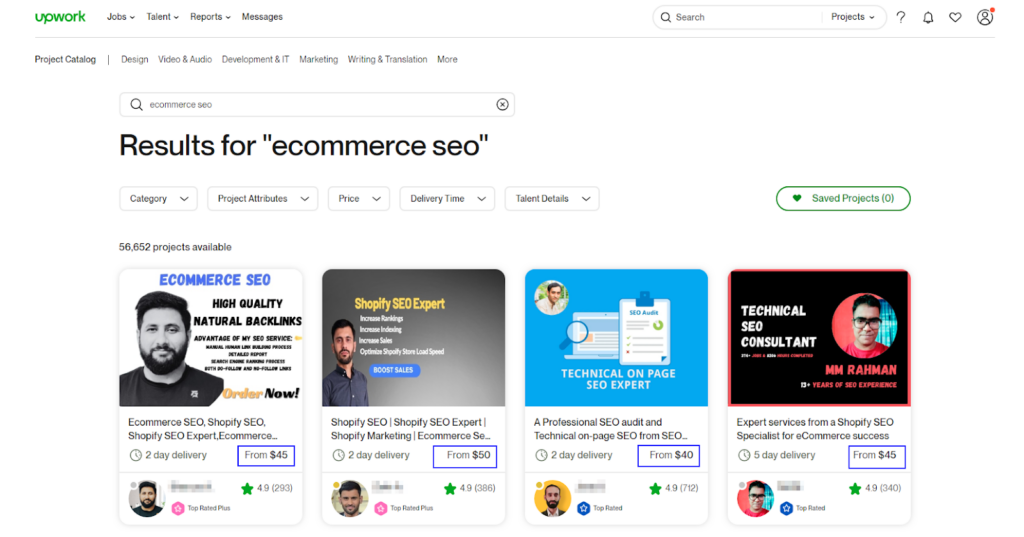
Hourly rates are not ideal for long-term SEO. Consider a retainer agreement instead, which offers more predictable costs.
However, if you choose hourly billing, here’s what to expect:
For small and mid-sized businesses
- Cost Range: $2000 – $2800 per month
- Hourly Rate: $40 – $70 per hour
- Working Hours: Up to 50 hours per month
For mid-sized to large businesses
- Cost Range: $2500 – $7500 per month
- Hourly Rate: $50 – $150 per hour
- Working Hours: Up to 50 hours per month
Smaller businesses typically require fewer monthly hours than larger ones. The estimated working hours for larger businesses are flexible depending on specific project needs.
Fixed Packages
Many agencies offer pre-defined SEO packages with a set price for a specific set of deliverables. This approach is ideal for businesses with a well-defined budget and clear SEO goals.
For example, eCommerce website SEO packages may include keyword research, on-page optimization, and basic link building for a fixed monthly fee.
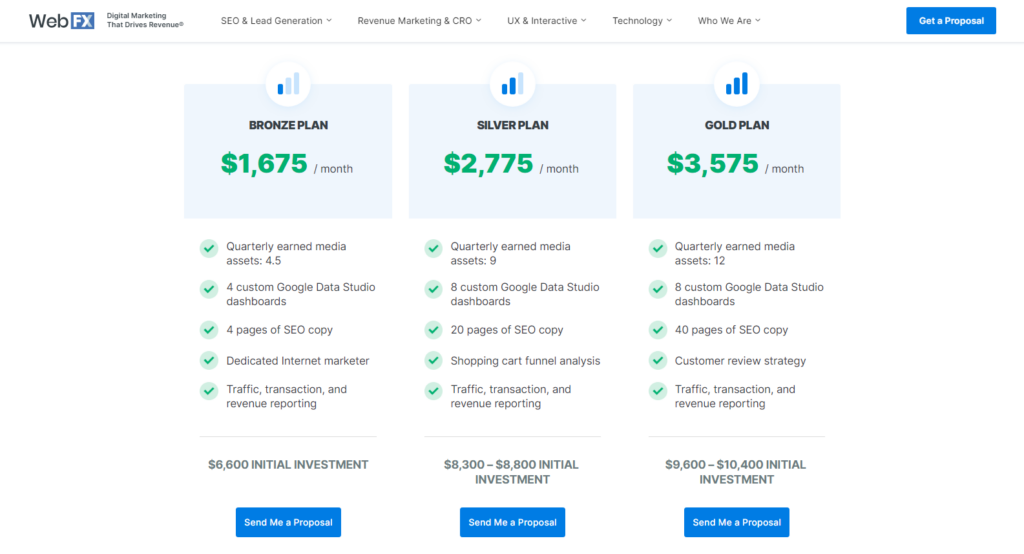
Prices can vary widely depending on the comprehensiveness of the eCommerce SEO packages, typically ranging from $1500 to $6,000 per month.
While this offers peace of mind for budgeting, it’s important to consider that these plans may not be as adaptable as custom solutions. They might not perfectly tailor to your website’s unique needs or evolving industry trends.
Custom Monthly Retainer
Meet the most flexible option that allows you to customize an SEO strategy to your unique business goals and competitive market.
An SEO agency will assess your website, analyze your competition, and then create a personalized plan that outlines the specific tactics and resources needed to achieve your desired results.
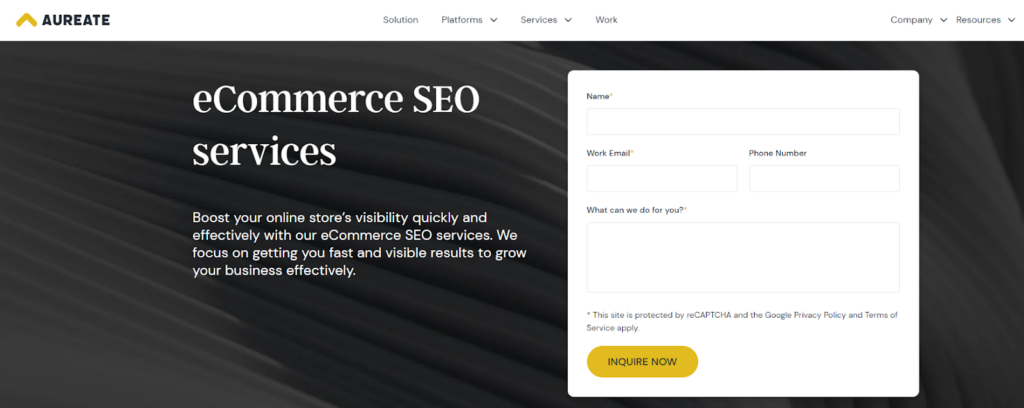
I’d say this is the most effective option for medium to large businesses. Because at this higher stage, you need a keen focus on building authority in the market. Otherwise, your growth will become stagnant.
Retainers typically come with a higher cost compared to other models that range from $750 – $10,000 based on your business size.
Wondering why the one-time project cost is not given here?
SEO is an ongoing process. You can’t say no to SEO till you’re selling. So unlike Shopify store development service or eCommerce UI/UX design service, the SEO services don’t come with a one-time project cost.
Now let’s check out the cost based on the specific Ecommerce SEO services.
What are the Ecommerce SEO Pricing based on Services?
Do you know — some merchants also prefer buying specific SEO services like On-page SEO, Link building, SEO-based content writing, and many more.
That’s why we were unable to skip this important section. Let’s go through the SEO pricing for specific ecommerce SEO services below:
| Services | Description | Pricing (Monthly Retainer) |
| Keyword Research & Competitor Analysis | Identifying the best keywords for your business with relevant search intent, and analyzing your competitor’s SEO strategies to understand their strengths and weaknesses. | $500 – $2,000 |
| Content Strategy & Content Creation | Developing a content plan to target keywords and attract organic traffic, potentially including product descriptions, blog posts, and landing pages. Writing high-quality, informative content that attracts organic traffic and builds authority. | $1,000 – $5,000+ |
| On-Page Optimization | Optimizing product pages, category pages, and other website content for relevant keywords, improving title tags, meta descriptions, and header tags. | $500 – $3,000 |
| Technical SEO & Speed Optimization | Ensuring your website is technically sound and loads quickly, includes fixing broken links, optimizing website structure, and improving mobile responsiveness. | $500 – $2,500 |
| Link Building or Off-page Optimization | Acquiring high-quality backlinks from other websites to improve your website’s authority and ranking. | $1,000 – $5,000+ |
Please note: These are estimated pricing ranges and can vary depending on factors like project size, industry competitiveness, and agency experience.
Let’s go beyond the cost and understand the factors that can affect the eCommerce SEO cost in the next section.
What Determines eCommerce SEO Pricing?
Have you ever looked at an eCommerce SEO quote and scratched your head, wondering how they arrived at that big number?
Haha… I know you did!
Let me explain — Just like your online store is unique, the cost to optimize it for search engines will vary depending on several key factors.
Let’s learn about all the factors that influence ecommerce SEO pricing!
1. The Expertise You Choose
The very first factor influencing your SEO price tag is the level of expertise you bring on board.
Here’s a breakdown of the three main choices:
- In-House SEO Team
- Freelancer SEO Experts
- Ecommerce SEO Agencies
Now let’s check out the table below that compares different SEO expertise and their influence on the cost.
| Factor | In-House SEO Team | Freelancer SEO Experts | SEO Agencies |
| Cost | High (Salaries, Training, Benefits, Tools) | Moderate (Hourly rate or project-based) | High (Retainers, Packages) |
| Control | High – Direct control over strategy and execution. | Moderate – Can set goals and direction, but less control over daily tasks. | Low – Agency manages strategy and execution. |
| Ecommerce Focus | May require additional training for team members. | Expertise can vary. May need to supplement with additional services. | High focus on ecommerce platforms and best practices. |
| Expertise Level | Varies based on team composition. Can be a mix of experience levels. | Varies – Can be highly skilled or more generalist. | Typically high level of experience with dedicated ecommerce SEO specialists. |
| Influence on Cost | Team size, experience level of each member, and chosen tools. | Hourly rate or project fee directly linked to expertise. | Expertise in specific ecommerce SEO tactics, industry knowledge, and agency size. |
| Benefits of Expertise | Deep understanding of your company’s specific needs and goals. Alignment with company culture. | Potentially lower cost than in-house team. Flexible engagement options. | Specialized knowledge of ecommerce SEO best practices. Access to a wider range of tools and resources. |
| Scalability | Requires significant resources to scale expertise. | Can be easily scaled up or down based on project needs. | Can easily scale expertise based on budget. |
| Drawbacks of Expertise | High upfront investment for building a team. May require additional training for team members. | Finding a freelancer with the right fit for your needs can be challenging. Limited access to resources compared to agencies. | Higher cost than in-house or freelancers. May not be as familiar with your specific business needs. |
| Industry Knowledge | May require additional investment to gain deep industry knowledge. | Expertise can vary. Some freelancers specialize in specific industries. | High level of industry knowledge, particularly for agencies focused on ecommerce. |
| Project Management | Requires internal project management resources. | Limited project management support unless specifically offered by the freelancer. | A dedicated project manager ensures smooth execution. |
| Reporting & Analytics | Requires investment in SEO tools and in-house data analysis. | May provide basic reporting, but advanced analytics might require additional tools. | Comprehensive reporting and data analysis with insights specific to ecommerce. |
| Content Creation | May need to hire additional content writers or outsource content creation. | Capabilities vary. Some freelancers offer content creation as an add-on service. | Can provide content creation services optimized for ecommerce SEO. |
Now, let’s explore all the three choices you have to onboard.
In-House SEO Team
If you already have a team with existing SEO knowledge, you might choose to handle some aspects in-house and utilize tools and resources.
Building an in-house team gives you the most control. However, this requires significant investment in salaries, training, and SEO tools. It’s best suited for large businesses with dedicated marketing budgets.
Freelancer SEO Experts

Freelancers provide a cost-effective alternative, often charging hourly rates. You can easily find them on platforms like Upwork, Fiverr, etc.
Hiring individual SEO experts provides flexibility, but evaluating them to ensure their qualifications and proven track record is crucial. This option is best for
- small businesses with basic SEO needs,
- short-term SEO requirements, and
- need for specific services.
However, one bitter truth is — Solo operators may not have the bandwidth for complex SEO requirements.
Ecommerce SEO Agencies
If you’re looking for a holistic SEO approach (and minimize the headaches), you can consider hiring the best eCommerce SEO company.
Partnering with an SEO agency offers:
- comprehensive solution,
- diverse skillsets at one place,
- wealth of experience, and
- proven track record.
Agencies have a team of specialists covering keyword research, on-page optimization, link building, and technical SEO. This comprehensive approach comes at a premium cost but offers a one-stop shop for all your SEO needs.
2. Services included in your Plan
Ecommerce SEO goes beyond basic website optimization. It consists of various activities that have their own weight or priorities.
Here’s a breakdown of the services that typically influence pricing:
Keyword Research & Analysis
Identifying the golden keywords that your target audience searches for is the foundation of a strong SEO strategy.
In simpler terms, keyword research helps you understand what people are searching for online, and how you can optimize your website to show up in those search results.
Your SEO provider will become a detective, uncovering the search terms your ideal customers are using to find products like yours. They’ll analyze competitor strategies, search trends, and industry jargon to create a targeted keyword list that drives qualified traffic.
In-depth keyword research requires time and expertise, and a plan with a wider range of targeted keywords will naturally cost more than one focusing on a smaller, less competitive set.
Here are some real-life examples of Keyword Research pricing:
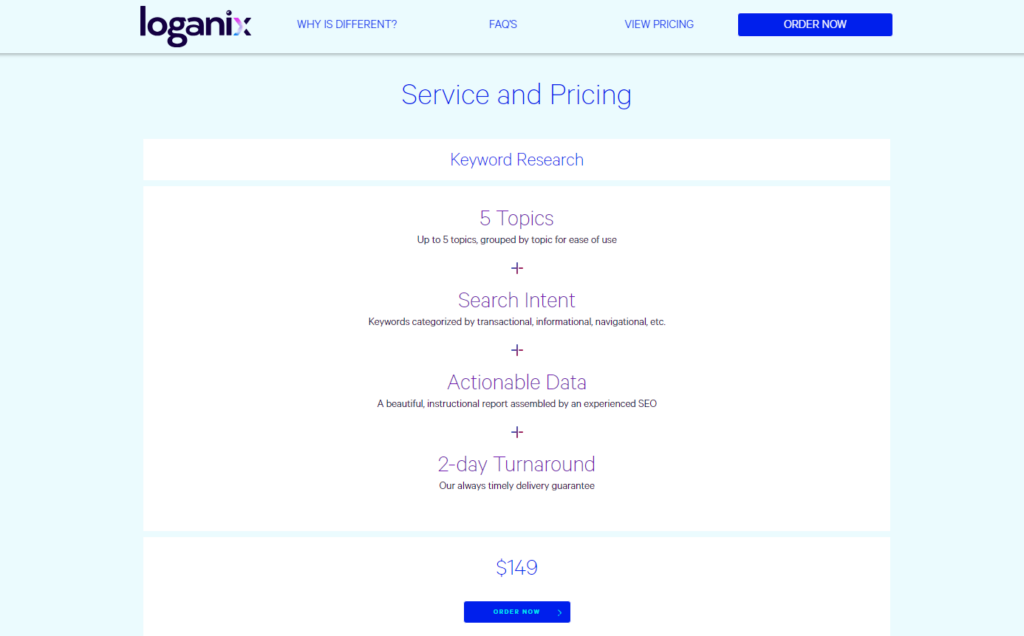
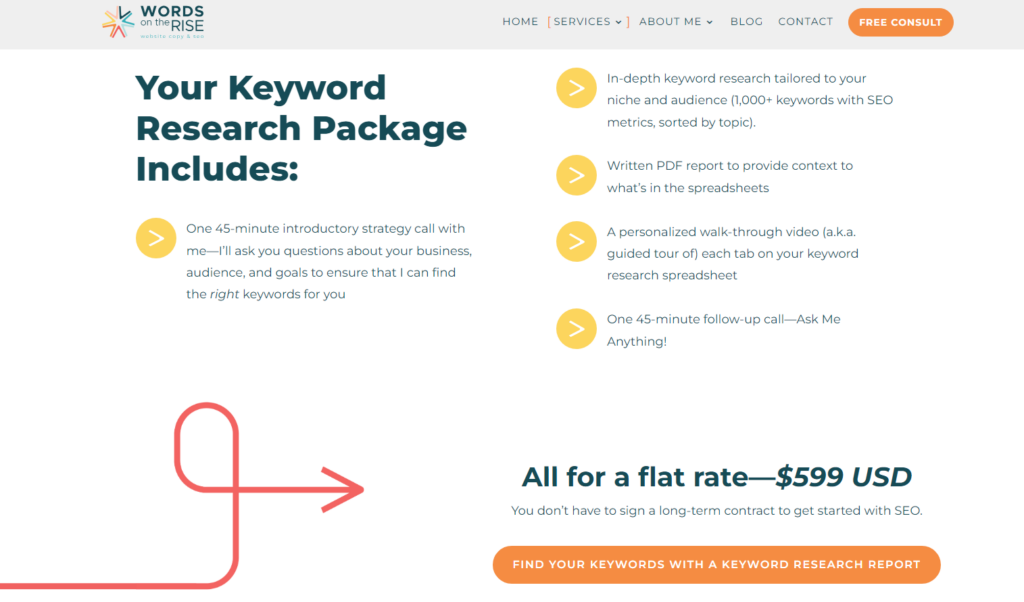
On-Page Optimization
Once you have your keywords list, it’s time to optimize your website to be search-engine friendly. This involves fine-tuning your product pages, category descriptions, and even your blog content.
Your SEO partner will ensure your website speaks the language, that search engines love to hear. Thus, they focus on making it crystal clear what you offer and why it’s perfect for your target audience. This service includes
- optimizing product descriptions,
- title tags,
- meta descriptions,
- header tags,
- image alt text,
- internal linking architecture,
And the overall content of your pages to be relevant and informative for both search engines and users. The more complex your product pages and the more optimization required, the greater the impact on the cost.
Technical SEO
The technical health of your website is crucial for search engine crawlability. This process ensures your website’s code is clean, efficient, and easy for search engines to crawl and understand.
Services in this area may include fixing crawling errors, optimizing website speed and code structure, and ensuring mobile-friendliness. These factors all contribute to a positive user experience, which search engines value highly.
Your SEO specialist will act as your website’s mechanic, and ensure it runs smoothly and efficiently for both search engines and your customers. Addressing complex technical issues can be time-consuming and require specialized skills, potentially increasing the cost of your plan.
The technical SEO packages may look like this:
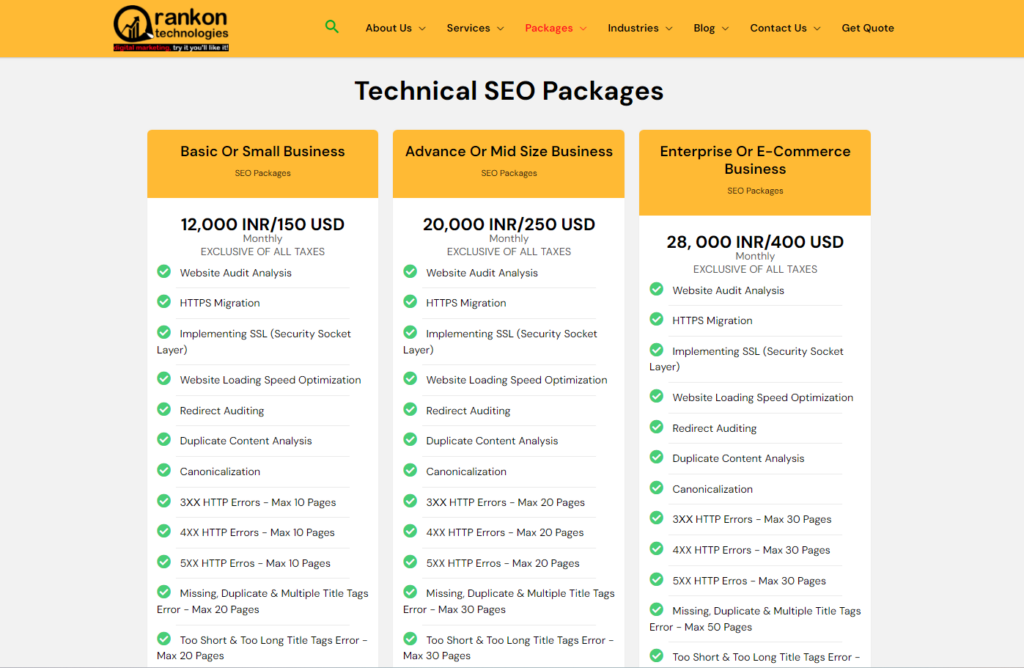
Content Creation
High-quality, informative content that engages your audience is a powerful SEO tool. And for attracting and engaging organic traffic, you need quality content.
This can include product descriptions, blog posts, buying guides, and other resources that provide value to your target audience. The cost will depend on the type of content (articles, blog posts, product descriptions) and the volume required.
Here’s an example!
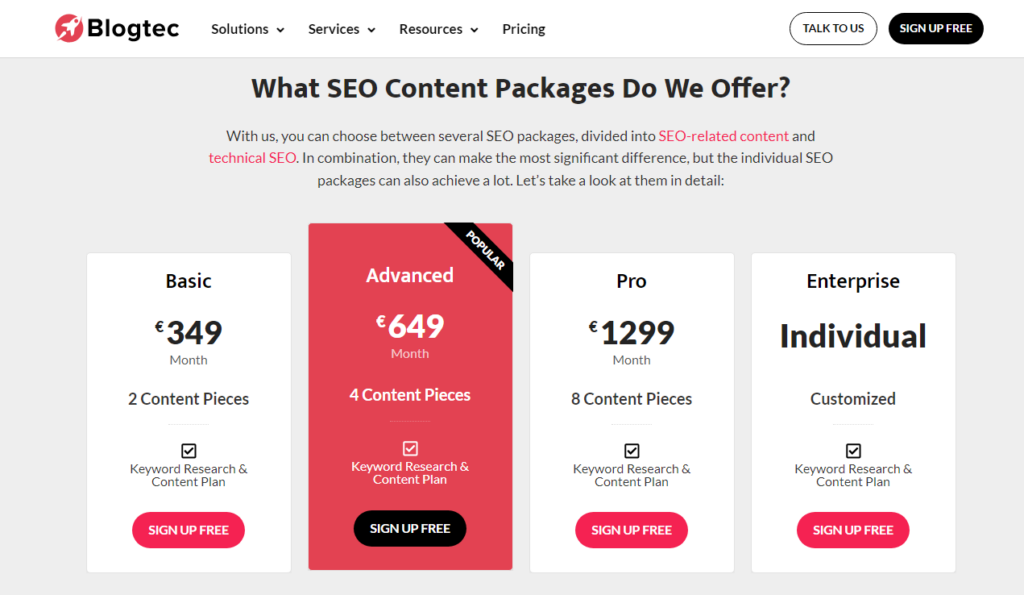
A plan with a focus on ongoing content creation will naturally be more expensive than one with minimal content creation.
Off-page SEO
Building your website’s authority and reputation is the ultimate goal of eCommerce SEO! Earning backlinks from reputable websites boosts your website’s authority in the eyes of search engines.
Your SEO provider might secure backlinks from high-authority websites in your niche, manage your online reputation, and even build a social media presence for your brand.
Building high-quality backlinks is a time consuming and ongoing process, and the cost will reflect the effort required to secure these valuable links.
See how some agencies charge for Off-page SEO and link building:
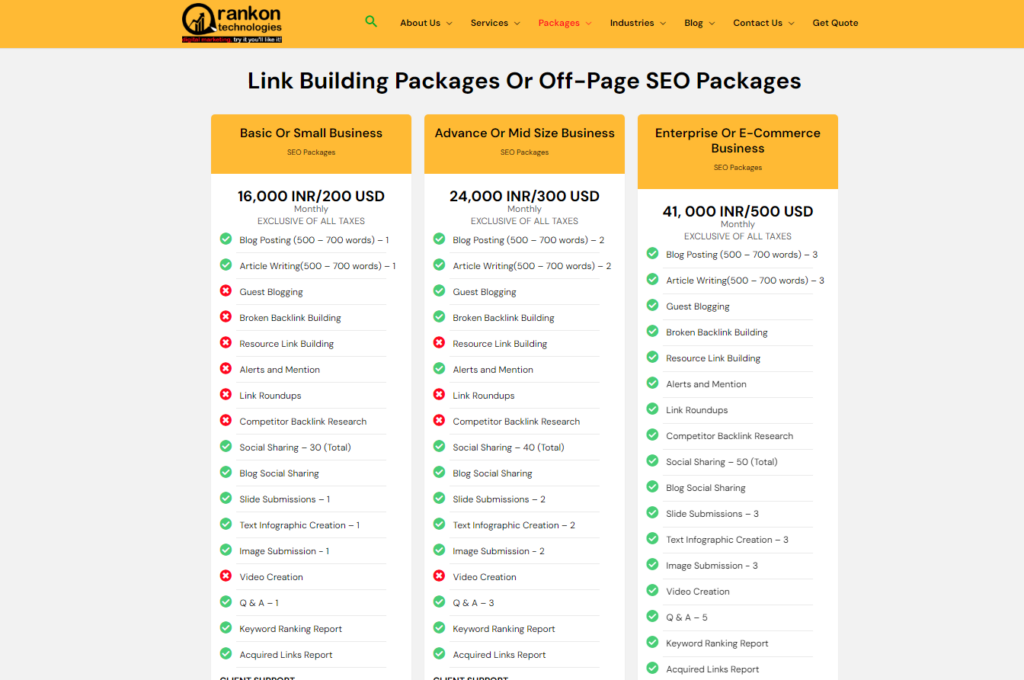
3. What Tools & Resources are Used
The cost of your ecommerce SEO plan isn’t just about the services themselves, but also the tools and resources needed to execute the strategy effectively.
Just like a carpenter needs a hammer and saw, SEO professionals rely on various tools to analyze your website, research keywords, and track progress. The specific tools used can significantly impact the cost of your plan.
There are a lot of free and paid SEO tools available, each offering a different level of functionality and data.
Here’s a breakdown to help you understand the options:
Free SEO Tools:
- Google Search Console
- Google Analytics
- Google Keyword Planner
- Screaming Frog SEO Spider
- AnswerThePublic
Paid SEO Tools:
- Ahrefs
- SEMrush
- Moz Pro
- SpyFu
- Majestic
The cost of your SEO plan will be partly determined by the tools used. Agencies with access to a wider range of paid SEO tools can offer a more comprehensive and data-driven approach. So, make sure to ask which tool your SEO providers are using.
4. Target Reach
Suppose your ideal customers are searching for you online. What keywords would they use? How many people are searching for those terms each month?

The “target reach” refers to the scope of that search net you’re casting. Here’s how your target reach can influence the cost of your SEO strategy:
Local vs. Global Reach
Are you a local bakery with a loyal clientele in your town, or do you dream of shipping your handcrafted sourdough across the country?
The geographic scope of your target audience significantly impacts SEO pricing. Optimizing for local searches (“best bakery near me”) requires a different strategy than competing for national keywords (“organic sourdough bread”).
Local SEO campaigns are typically less expensive as they focus on a smaller geographic area and less competitive keywords.
Traffic Volume vs. Conversion Rate
Some keywords might have a high search volume (many people searching), but a low conversion rate (few people buying). An SEO agency experienced in ecommerce will understand the importance of balancing traffic volume with conversion rates.
Targeting keywords with a good balance of both might cost more upfront, but ultimately lead to a higher return on investment (ROI).
Target reach isn’t just about raw numbers. Focusing on keywords with high conversion intent (meaning users are more likely to buy) is more valuable than attracting a vast audience with minimal buying interest.
An experienced SEO agency can help you determine the optimal target reach for your ecommerce business.
5. Size & Complexity of Your eCommerce Website
Imagine a small local bakery compared to a multi-level shopping mall. The bakery owner can likely manage basic inventory and keep things tidy themselves.
The mall, on the other hand, requires a team to navigate the complexities of numerous stores and diverse offerings. The same applies to SEO!
A smaller website with a limited product range requires less SEO effort compared to a vast ecommerce site with thousands of products and intricate category structures.
SEO involves optimizing various elements on your website. The more pages, products, and functionalities you have, the more time and resources an SEO agency needs to invest.
Here’s how website size and complexity influence cost:
- Number of Pages: A website with a handful of product pages requires less optimization compared to a mega-store with thousands of products. Each page needs keyword research, on-page optimization, and potentially content creation, impacting the overall cost.
- Product Variations: Do your products have multiple variations (size, color, etc.)? Optimizing each variation requires additional effort, potentially increasing the cost.
- Technical Complexity: Websites with complex features like faceted navigation, user accounts, or dynamic content might require advanced technical SEO expertise to optimize properly, leading to a higher price point.
- Content Management System (CMS): The platform your website is built on (e.g., Shopify, WooCommerce) can influence SEO complexity. Some platforms offer built-in SEO features, while others require more technical expertise to optimize.
Let’s understand with an example!
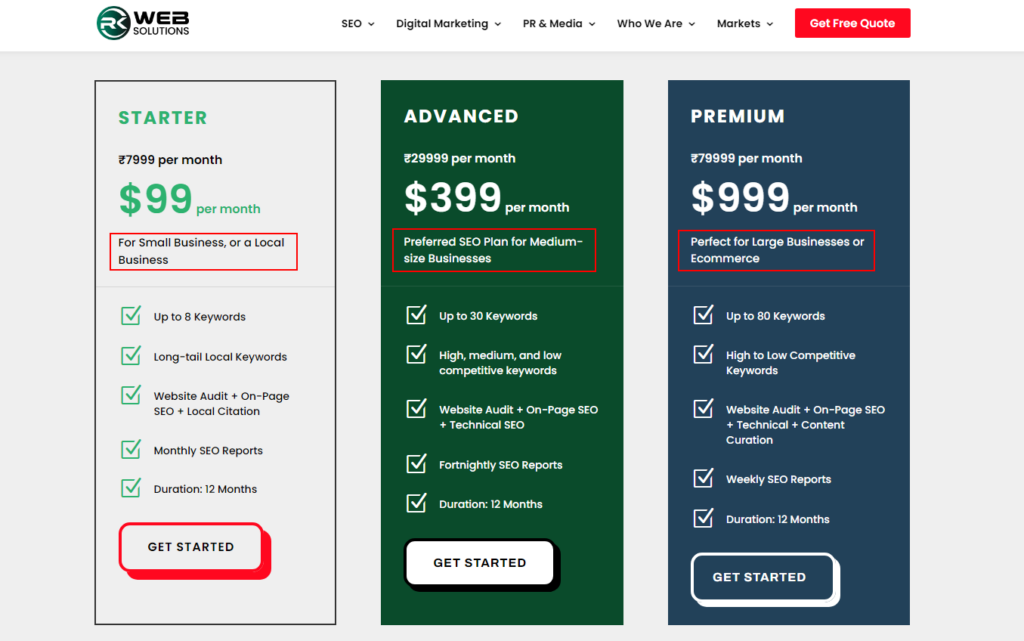
(1) Starter Stores: For smaller businesses with a focused product range and manageable competition, a basic eCommerce SEO package might suffice. This typically includes keyword research, on-page optimization, and some technical SEO work.
(2) Established Stores: As your store grows, the competition gets higher. You’ll likely need a more comprehensive plan encompassing content creation, link building, and ongoing performance monitoring.
(3) Enterprise Stores: Large online retailers with vast product catalogs and international ambitions require a full-fledged SEO team. This comprehensive approach involves in-depth competitor analysis, advanced technical SEO strategies, and ongoing content creation at scale.
So, the time and expertise required to optimize a larger, more complex website naturally tend to a higher SEO cost.
6. Industry & Competition You Possess
Some industries are inherently more competitive online than others, like electronics or fashion. For example, ranking for keywords related to “electronics” might be more challenging (and expensive) compared to a niche market like “handmade pottery.”
The higher the competition within your industry, the more resources an SEO agency needs to invest in your campaign to achieve top rankings.
Here’s how the level of competition impacts SEO pricing:
Keyword Difficulty
Competitive industries naturally have keywords with higher difficulty scores, meaning it’s tougher to rank for them on search engines. This creates a need for more in-depth keyword research, content creation, and link-building strategies, all of which influence cost.
Content Needs
In competitive industries, high-quality, informative content is essential for standing out. The more content creation your SEO plan includes (e.g., blog posts, product guides), the greater the impact on the cost.
Link Building Strategies
Building high-quality backlinks is a crucial aspect of SEO, especially in competitive industries. The more established your competitors are, the more effort and resources an SEO agency might need to secure valuable backlinks for your website.
Securing high-quality backlinks often requires dedicated effort from SEO professionals, potentially affecting cost.
7. Your Goals & Desired Results
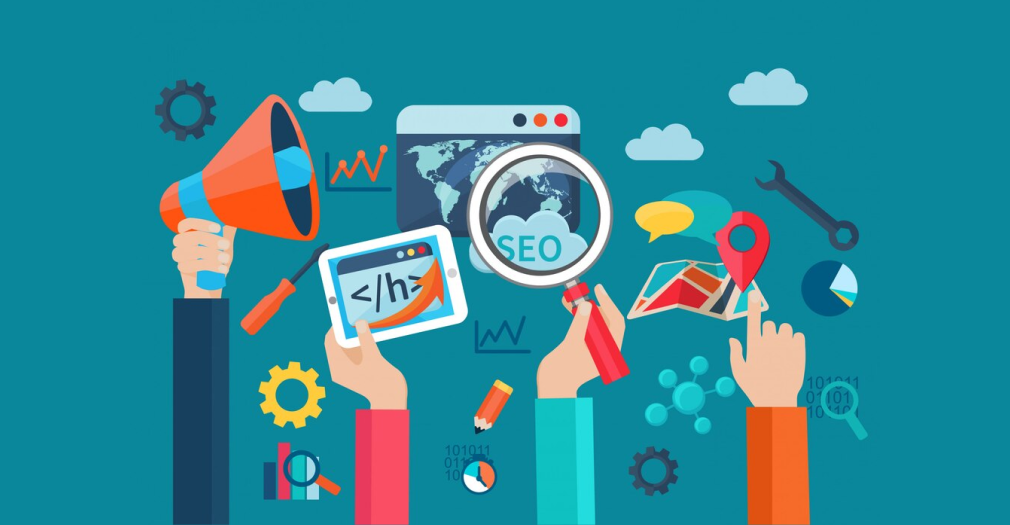
The more complex your SEO goals and the more desired results you seek, the more comprehensive your SEO strategy needs to be.
Actually, I would say — your goals and expected outcomes are the driving force behind your eCommerce SEO strategy and ultimately influence the pricing.
Here’s how your SEO goals can impact the cost of your campaign:
Increased Organic Traffic
Do you want to attract more visitors to your website in general? Or are you targeting a specific audience with laser focus?
A broader traffic goal might require less targeted keyword research and content creation compared to a campaign focused on a niche audience.
Improved Conversion Rates
Is your primary goal to drive more sales from your existing website traffic?
An SEO strategy focused on conversion rate optimization (CRO) tactics alongside keyword research and on-page optimization might cost more than a plan simply focused on attracting visitors.
Brand Awareness & Visibility
Do you want to build brand recognition and establish yourself as an authority in your industry? This might involve content marketing strategies like blog creation and social media outreach, which can add to the cost of your SEO plan.
Local SEO Focus
Looking the online shoppers to visit your physical store too?? Or as a local service provider looking to attract customers in your area?
Local SEO campaigns typically require a different approach compared to national or global SEO strategies. Based on the target region you choose, you can see a great difference in the SEO cost.
This is how different factors are associated with E-Commerce SEO pricing. So whenever you get a quotation with huge figures, sit and understand what factors are influencing the cost. And whether it is worth it or not.
I know cost really matters but do you think it is fair to solely choose the eCommerce SEO service based on the pricing? No… right??
Let’s learn more about this and prevent your business from trap.
Why Price Shouldn’t Be Your Only Deciding Factor?

While a budget-friendly option might seem tempting, remember: you’re investing in the long-term health and growth of your online store.
Here’s why focusing solely on cost can backfire and why investing in value-driven SEO is the key to long-term success.
1. Different Needs, Different Costs
Just like no two ecommerce stores are exactly the same, SEO needs will vary depending on your industry, competition, and website health. A cheap, one-size-fits-all approach simply won’t cut it.
A reliable SEO partner will take the time to understand your unique business goals and develop a customized strategy to achieve them. This personalized approach requires expertise and experience, which naturally comes at a premium.
2. Focus on Value, Not Just Cost
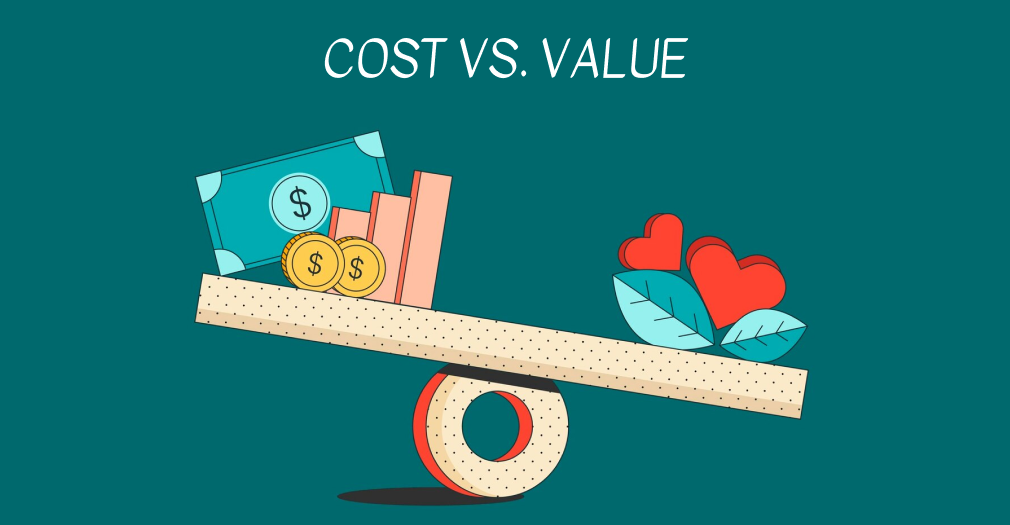
Think of SEO as an investment, not an expense. A skilled SEO service provider will deliver tangible results like increased organic traffic, improved conversion rates, and ultimately, more sales.
But firstly, they will take the time to understand your unique business goals, target audience, and competition level. They’ll craft a customized strategy that goes beyond just keyword stuffing, prioritizing long-term growth through sustainable practices.
While the initial cost might seem higher compared to a budget option, the long-term return on investment (ROI) far outweighs the upfront cost.
3. Low Price Often Means Low Quality
Budget-friendly SEO services often rely on black-hat tactics like keyword stuffing or buying links. These practices can hurt your website’s ranking in the long run, even leading to penalties from search engines.
Reputable SEO firms prioritize white-hat practices that align with Google’s guidelines. Investing in the right SEO service ensures you’re getting a team that ensures your website remains search-engine friendly and trustworthy.
4. Risk of Hidden Fees and Unexpected Costs

You may get some attractive deals on E-Commerce SEO services from some companies. For example, a company may offer you a comprehensive eCommerce SEO package at a Flat $49 per month. Do you think it is reliable? Never!!
Beware of SEO services that advertise unrealistically low prices. These offers often come with hidden fees or limitations that can quickly inflate the overall cost. A transparent SEO agency will provide a clear breakdown of costs upfront, so you know exactly what you’re paying for.
So, how do you find a valuable SEO partner for your eCommerce business?
The ideal SEO service should feel like an extension of your team. Look for a company that takes the time to understand your business and communicates openly throughout the process.
The right SEO partner doesn’t focus only on search engine ranking, but on how they can help your business. So, they should ask questions like,
- What makes your business, content, and or service unique, and therefore valuable to customers?
- What does your common customer look like and how do they currently find your website?
- How does your business make money and how can search help?
- What other channels are you using Offline advertising, social networks?
- Who are your competitors?
- What do they do well online and potentially offline?
They’ll want to know this information to make sure your website gives value to your current and potential new audience.
If the SEO doesn’t seem interested in learning about your business from a holistic standpoint, look elsewhere, it’s difficult to do good SEO without knowing about a business’s goals, their customers, and other existing marketing efforts.
In a nutshell, SEO should complement your existing work.
Now if you are overwhelmed which SEO services should I pick? Do I need a comprehensive package or do I need to focus on a specific area?
Don’t worry. The next section has the answer!
How Can I Evaluate My E-commerce SEO Needs?
Many store owners are unsure of where to start or how to assess their SEO needs.
Here we have divided the eCommerce SEO into 4 stages. Now you have to identify your business to which stage to confidently evaluate your ecommerce SEO services requirements.
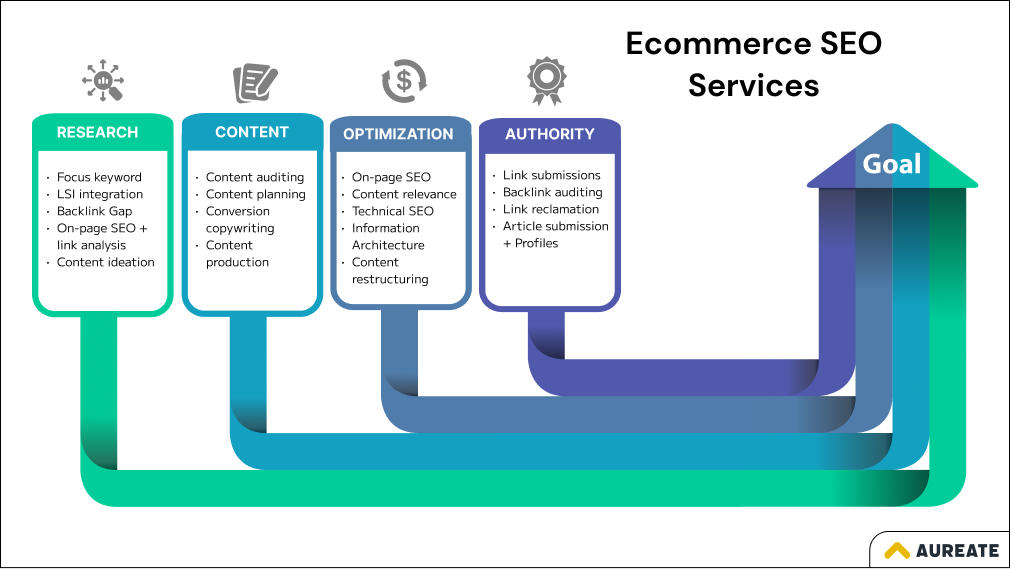
Let’s explore all four stages one by one!
1. Research & Ideation
How is your audience finding you? Which queries they are using? How many users are using those queries? Blah..blah..blah…
The first stage involves the deep analysis of your eCommerce business, the target industry or niche, your target audience, the golden keywords, your competitors, and their strategy.
How to know whether you fall into this stage?? Few signs can help you out!
Signs that your business falls into the Research & Ideation stage:
- Your website is new.
- You’re unsure of your target audience.
- Traffic is low or stagnant.
- You’re not sure how competitors rank so high.
- You don’t have a content marketing strategy in place.
- Your website’s on-page SEO is lacking.
If you’re in this stage, you need an SEO service that offers complete keyword research and competitive analysis.
Here’s what we include in this initial stage:
- Strategic Keyword Research: We’ll identify high-value keywords with solid search volume, integrating LSI (Latent Semantic Indexing) for better ranking potential.
- Backlink Gap Audit: We’ll identify areas where your competitors have a backlink advantage and help you develop a strategy to catch up.
- On-page SEO & Internal Link Analysis: We’ll analyze your website’s on-page SEO elements and suggest improvements to enhance search engine visibility.
- Content Ideation: We’ll brainstorm content ideas that resonate with your target audience and support your SEO goals.
If you’re starting, contact us for complete keyword research and competitive analysis.
2. Content Creation

Some clients reach us saying, “Hey, we’re all set with the keyword identification so far. Can you please help us with the content strategy aligned with our target keywords? Or even content production?”.
In more clear words, this stage is where you seek content development that resonates with your target audience. Based on the user search queries, your website content will rank on the SERP (search engine result page) and get more users to your online store.
Here are some signs that your business falls into the Content Creation stage:
- You’re not seeing the kind of organic traffic you’d like.
- You don’t have a clear brand voice or message.
- Your competitors are outranking you with informative content.
- Your website lacks informative content like blog posts or product descriptions.
- You’ve identified some high-value keywords but haven’t implemented them yet.
- You lack fresh, engaging content that keeps visitors coming back.
If this sounds like your business, you need an SEO service that offers content creation specifically tailored for e-commerce brands.
Here’s what we can offer you:
- SEO-Optimized Blog Content: Our team of writers will create informative and engaging blog posts that target your chosen keywords and provide value to your audience.
- Product Page Optimization: We’ll optimize your product descriptions with relevant keywords and rich content to improve search ranking and conversion rates.
- Category and Brand Page Content: We can craft compelling content for your category and brand pages to enhance user experience and search engine visibility.
- Content Calendar & Strategy: We’ll help you develop a content calendar and strategy to ensure consistent content creation that aligns with your overall SEO goals.
Need help with high-quality content that follows Google’s E-E-A-T guidelines?? Let’s connect!
3. Optimization
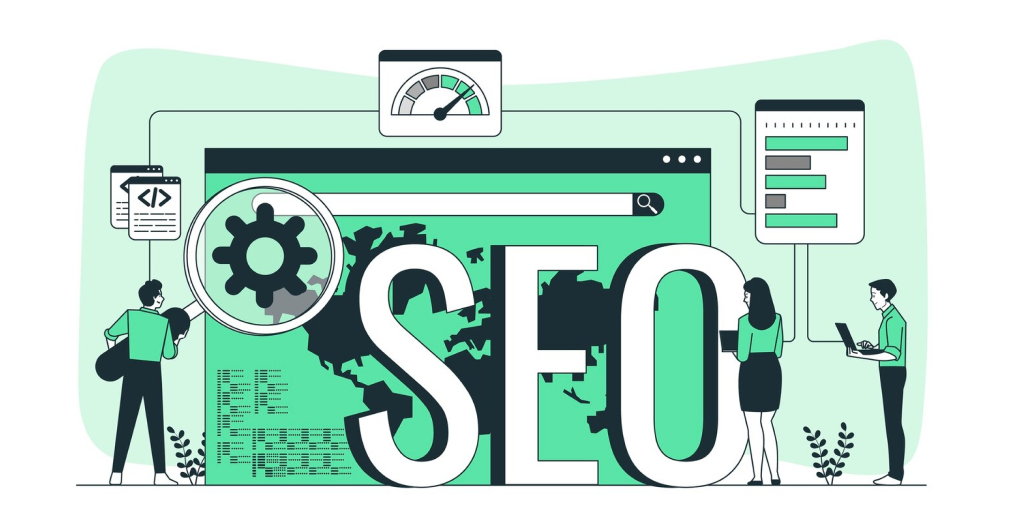
Is your website full of content, but organic traffic remains low? You’re not alone!
Many businesses fall into the trap of focusing solely on content creation. However, even the most amazing content won’t rank well in search engines without proper SEO optimization. Yes, you heard that right!
Do you have the same question? If yes, you are in the third stage which is a combination of all the first three states: 1) Keyword research, 2) Content creation, and 3) SEO optimization!
Search engines need more than just content to understand your website’s value. Here is a perfect example!
If you sell eco-friendly dog toys, you might not target the broad keyword “dog toys” on your homepage. Instead, your SEO strategy should focus on optimizing product pages for long-tail keywords like “eco-friendly squeaky dog toy” or “durable chew toy for teething puppies”.
Here’s how you can identify if your store needs an SEO optimization boost:
- Your website has content, but it might not be optimized enough.
- You’re not seeing the organic traffic growth you desire.
- Your website ranks for some keywords, but not the ones that convert best.
- Your website is slow to load.
- Your website navigation is confusing or cluttered.
- Your website isn’t mobile-friendly.
- Your images aren’t optimized.
- Your website lacks a clear internal linking structure.
If you recognize these signs, it’s time to optimize your website for search engines. Here’s what a comprehensive SEO optimization service typically includes:
- Technical SEO Audit: We’ll crawl your website and identify technical issues that could be hindering your search engine ranking.
- Website Speed Optimization: We’ll implement strategies to improve your website’s loading speed, ensuring a smooth user experience.
- On-Page SEO Optimization: We’ll optimize your product pages, category pages, and even your homepage with relevant keywords and rich content to enhance search engine visibility.
- Image Optimization: We’ll optimize your product images with descriptive file names and alt text to help search engines understand their relevance.
- Internal Linking Strategy Development: We’ll create a strategic internal linking structure that connects relevant pages on your website and improves user navigation.
While product pages are crucial, overall website optimization shouldn’t be neglected. And we can ensure an SEO-friendly browsing experience for your customers.
Get effective SEO optimization services for your eCommerce website!
4. Authority Building
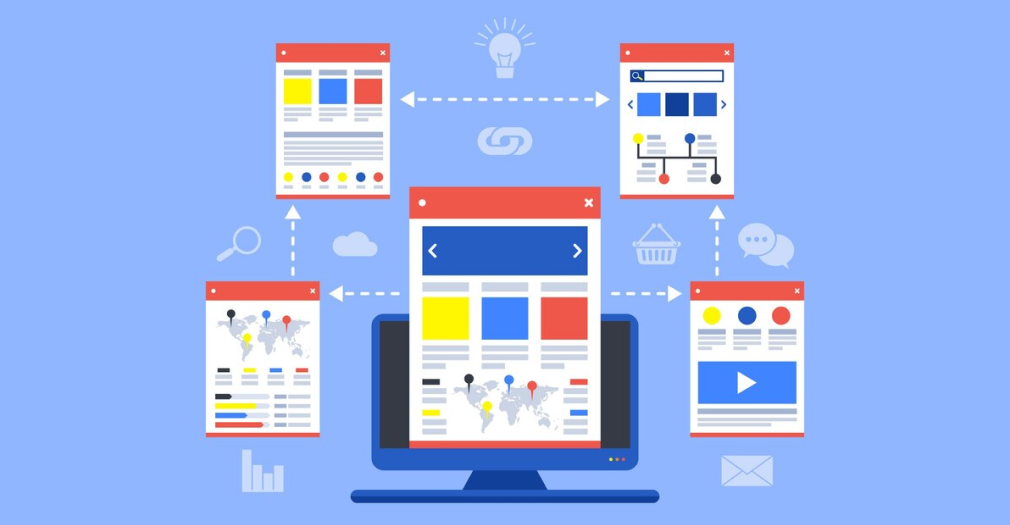
Whatever you do to optimize your website’s SEO, the ultimate goal is to establish your brand as an authority in your niche. Thus, the last stage is building authority with off-page SEO!
This stage focuses on earning recognition and trust from search engines and potential customers alike.
Search engines like Google consider how trustworthy and relevant your website is when ranking it in search results. The more established you are as a reliable source of information, the higher you’ll climb the search ladder.
Here’s how to know if you’re ready to focus on authority building:
- You’ve optimized your on-page SEO, but haven’t actively built backlinks.
- Your competitors have a strong backlink profile and consistently outrank you.
- Your brand awareness is low.
- You don’t have many backlinks from high-authority websites.
- You haven’t built strong relationships with influencers in your industry.
- You’re ranking for relevant keywords, but struggling to move to the top of the search results page (SERP).
If these signs sound familiar, you need SEO services that focus on off-page optimization and link building. Here’s what we can offer to help you build authority:
- Strategic Link Building: We move beyond simple link submissions, focusing on acquiring high-quality backlinks from relevant websites in your niche. Pay attention to their domain authority scores, a higher score indicates strong backlink juice, which is why you have to check with a domain authority checker to calculate metrics.
- Backlink Quality Analysis: We identify and remove any low-quality or potentially harmful backlinks that could negatively impact your SEO.
- Broken Link Reclamation: We identify instances where other websites might have linked to you in the past, but the link is now broken due to a page move or update. We’ll then reach out and request them to update the link to the correct page on your website.
- Content Marketing Outreach: Instead of simply submitting articles to random directories, we’ll develop a targeted content marketing strategy. This could involve creating high-quality content that resonates with your audience and then reaching out to relevant websites and publications to explore guest blogging opportunities or co-creation projects.
Let us build quality content and backlinks for your eCommerce website!
Common Ecommerce SEO Pricing Questions
I know some of your doubts haven’t been answered yet. That’s why we’re here with some questions that you may have in your mind.
What is Ecommerce SEO?
Ecommerce SEO is the art of optimizing your online store to rank higher in search engine results pages (SERPs) for relevant keywords. This helps potential customers discover your products when they’re searching for them online.
Why should I use Ecommerce SEO?
There are several compelling reasons why you should use Ecommerce SEO:
Reason 1: Organic Traffic
Attract more visitors to your store through search engines, and potentially convert them into customers. SEO is a free way to gain traffic, unlike paid advertising.
Reason 2: Cost-Effectiveness
Compared to paid advertising, SEO offers a long-term, cost-effective approach to driving traffic. Once you rank well, you can enjoy consistent website visits without constant investment.
Reason 3: Brand Credibility
Ranking high in search results builds trust and credibility for your brand. Consumers tend to view organic results as more trustworthy than paid ads.
Reason 4: Competitive Advantage
In a crowded online marketplace, good SEO gives you a significant edge over competitors who haven’t optimized their stores.
What do eCommerce SEO services include?
The eCommerce SEO services include a range of analysis and optimization services as follows:
- Ecommerce Keyword Research
- Competitor Keyword Analysis
- On-Page SEO Optimization
- Technical SEO Optimization
- Content Creation and Optimization
- Link Building
- Category Optimization
- Product Page Optimization
- User Experience (UX) Optimization
- Local SEO Services (If Applicable)
- Off-Page SEO Activities
- Enhance Mobile Search Performance
- Social Media Integration
- Regular Ecommerce SEO Audits
- GA and GSC Monitoring and Reporting
How do I find the best eCommerce SEO company?
Many factors are there that can help you find the best eCommerce SEO company. Here are some tips:
- Look for experience with eCommerce: Not all SEO companies specialize in e-commerce, so ensure they have a proven track record of success in your industry.
- Ask about their strategy: A good SEO company will be transparent about their approach and avoid guarantees of quick results.
- Focus on results, not tactics: While understanding their tactics is helpful, prioritize companies that focus on measurable results like organic traffic growth, conversion rate improvement, and increased sales.
- Check reviews and case studies: Read online reviews and ask for case studies showcasing their past work with similar e-commerce businesses.
- Get quotes and proposals: Compare quotes from several SEO companies and ensure their proposals clearly outline their services, pricing structure, and expected timelines.
How much should I spend on SEO per month?
Here are the average ecommerce SEO costs of what you can spend per month:
- Ecommerce SEO experts typically charge $40 – $150 per hour. This can be a good option if you have a small project or a specific need, such as keyword research or on-page optimization.
- Fixed SEO packages range from $1,500 – $5,000+ per month. These packages typically include a variety of SEO services, such as keyword research, on-page optimization, link building, and content creation.
- Ecommerce SEO agencies offer monthly retainers from $750 – $10,000+. This is the most comprehensive option and is typically best for larger businesses or businesses that need ongoing SEO support.
Ecommerce SEO costs can vary depending on the service provider and the complexity of your project.
Should I do my own SEO or hire someone?
Whether you do your own SEO or hire someone depends on your time, expertise, and budget.
DIY SEO is a good option if you have the time to learn and implement SEO best practices. There are many free resources available online to help you get started. Hiring an SEO professional is a good option if you don’t have the time or expertise to do SEO yourself, or if you have a large website or complex SEO needs.
Is an SEO Service Worth It for Ecommerce?
Yes, SEO is absolutely worth it for e-commerce businesses. A well-optimized website can rank higher in search engine results pages (SERPs), which can lead to more website traffic, sales, and brand awareness.
Is SEO necessary for small businesses?
Yes, SEO is necessary for small businesses too. SEO is an important aspect of any online presence. It helps ensure your small business website ranks higher in search results, making it easier for potential customers to find you.
Even if you have a limited budget, there are basic SEO practices you can implement to improve your visibility. And if you have little SEO knowledge you can do it by yourself or hire freelancers at affordable prices.
What is better SEO or Google ads?
There’s no single “better” option between SEO and Google Ads. SEO and Google Ads are not mutually exclusive and can be used together effectively.
SEO is a long-term strategy that can help you attract organic traffic to your website, while Google Ads is a pay-per-click (PPC) advertising platform that can help you reach a wider audience immediately.
When should I invest in Ecommerce SEO?
You should invest in Ecommerce SEO when you have a steady client base that covers the SEO costs. SEO is a strategic investment for long-term growth, rather than a quick fix for immediate financial needs.
So, before you invest ask a few questions to yourself:
- Are you ready for a long-term investment?
- Do you have access to copywriters?
- Do you understand what SEO can (and can’t) do?
- Is there room in your marketing budget?
Hope these answers will help you in your decision process. If you have other questions that remain unanswered, please feel free to jot them down in the comments section. We’d love to answer them! 🙂



Post a Comment
Got a question? Have a feedback? Please feel free to leave your ideas, opinions, and questions in the comments section of our post! ❤️